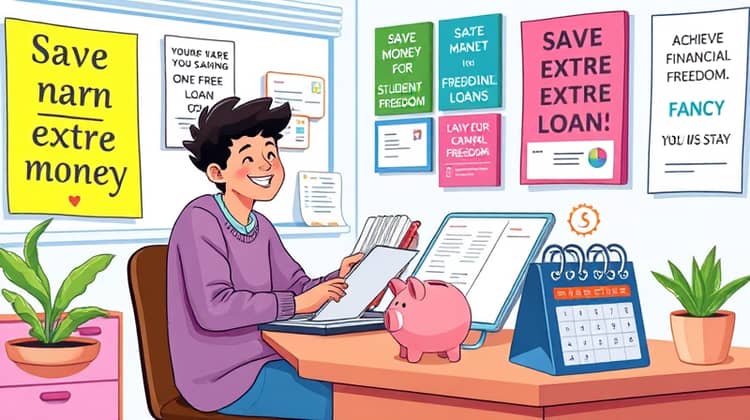Pay Off Student Loans Faster: 5 Tips to Get Ahead

Student loans can feel overwhelming, but with the right strategies, you can pay them off faster and alleviate that financial burden. Whether you're just starting to repay or are already deep in the process, there are several actionable steps you can take to make your repayments more manageable and accelerate your journey to being debt-free.
In this article, we'll share five essential tips that can help you pay off your student loans faster. From budgeting effectively to exploring new income opportunities, these strategies will empower you to take control of your finances and minimize the stress that comes with student debt.
With determination and the right strategies in place, you can significantly reduce your repayment timeline and set yourself on the path toward financial freedom. Let's dive into these tips!
1. Create a Budget and Stick to It

Creating a budget is the cornerstone of effective personal finance management. It involves tracking your income and expenses to ensure you live within your means and allocate funds toward debt repayment. When you have a clear budget in place, it becomes easier to identify areas where you can cut back and redirect those funds toward your student loans.
By sticking to your budget, you’ll develop a disciplined financial lifestyle that prioritizes paying off your loans. This practice not only helps you become more organized, but it also gives you peace of mind as you can see and measure your progress in real time.
- List all your sources of income.
- Track your monthly expenses, including necessities and discretionary spending.
- Allocate a specific portion of your income to student loan repayments. Make this non-negotiable in your budget.
- Adjust your budget monthly based on your financial situation and loan repayment goals.
Sticking to a budget may take some time to get used to, but it can significantly impact your ability to pay off student loans faster. Regularly reviewing your budget will help you stay on track and make necessary adjustments as your financial situation changes.
2. Consider Refinancing Your Loans

Refinancing your student loans can potentially lower your interest rates and reduce your monthly payments. This strategy allows you to consolidate multiple loans into one with better terms, which can make repayment simpler and more affordable. If you have good credit and a stable income, you might qualify for lower rates that could save you money over the life of your loans.
When considering refinancing, it’s crucial to evaluate both federal and private loan options. Federal loans often come with benefits like income-driven repayment plans and loan forgiveness programs, which might be sacrificed if you refinance into a private loan. Always weigh the pros and cons before making this financial decision.
- Research various lenders to find the best refinancing rates.
- Calculate potential savings and how they would affect your repayment plan.
- Apply for refinancing and review the new loan terms carefully before signing. Make sure it aligns with your financial goals.
Refinancing could be a game changer for those struggling with high interest rates. By securing a lower rate, you not only save money but can also pay off your loans much faster than you initially thought possible.
3. Make Extra Payments

Making extra payments on your student loans can lead to significant savings in interest and shorten the repayment period. If you can afford to pay more than the minimum each month, consider allocating these additional funds directly to the principal balance of your loans. This reduces the overall interest you'll pay and can help you clear your debts quicker.
Determine an amount that is feasible for your budget and commit to making extra payments whenever possible – whether it’s using a tax refund, bonus from work, or even spare change. Every little bit helps, and consistency is key.
- Make bi-weekly payments instead of monthly payments to reduce the principal faster.
- Use windfalls or bonuses to make lump-sum payments toward your loan.
- Set up automatic transfers to ensure extra payments are made consistently.
By making extra payments, you not only cut down your debt but also gain the psychological benefit of seeing your balance decrease more rapidly. This can boost your motivation to continue on your journey to being debt-free.
4. Explore Loan Forgiveness Programs

Loan forgiveness programs can provide relief for those who qualify. These programs often require borrowers to meet specific criteria, such as working in public service jobs, teaching in low-income schools, or making a certain number of qualifying payments. Understanding these programs can save you a significant amount in repayments if you qualify.
Before pursuing loan forgiveness, it’s essential to do thorough research to ensure you meet the requirements and understand all the stipulations. Speak with your loan servicer for specific details that pertain to your loans.
- Check if you qualify for Public Service Loan Forgiveness (PSLF).
- Investigate Teacher Loan Forgiveness if you are an educator.
- Look into income-driven repayment plans that may lead to forgiveness after a set period.
Utilizing loan forgiveness programs can be a lifeline for managing student debt. By strategically selecting your career path or repayment plan, you might be able to have a portion of your loans canceled, significantly easing your financial burden.
5. Increase Your Income

Increasing your income can provide more resources to allocate toward your student loans. This could come from taking on a second job, freelancing, or seeking promotions within your current job. Additional income allows you to put more toward your monthly payments, reducing your debt more quickly.
Explore different ways to leverage your skills or hobbies into money-making opportunities. Not only does this benefit your financial situation, but it also might lead you to discover new passions or career paths.
- Consider asking for a raise or finding a higher-paying job.
- Start a side hustle based on your skills or interests.
- Sell unwanted items or declutter your space for extra cash.
Focusing on income generation can have a profound impact on your loan repayment plan. With more income, you’ll enjoy greater flexibility with your budget while accelerating your path to freedom from student debt.
Conclusion

Paying off student loans may seem like a daunting task, but by implementing these five strategies, you can take meaningful steps toward financial freedom. The journey begins with creating a solid budget and identifying your financial priorities to ensure your loans are being actively managed.
Additionally, exploring options like refinancing and extra payments can lead to significant savings, while pursuing income-enhancing strategies further amplifies your repayment efforts. Navigating the world of student loans is challenging, yet entirely manageable with the right mindset and resources.
Remember, being proactive and informed is your greatest ally. Each tactic you incorporate helps in building a lifestyle that actively tackles student loans.”






